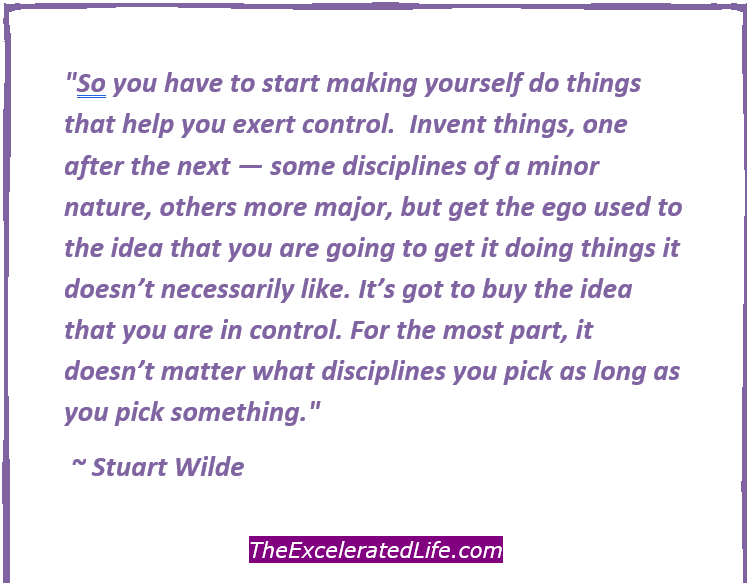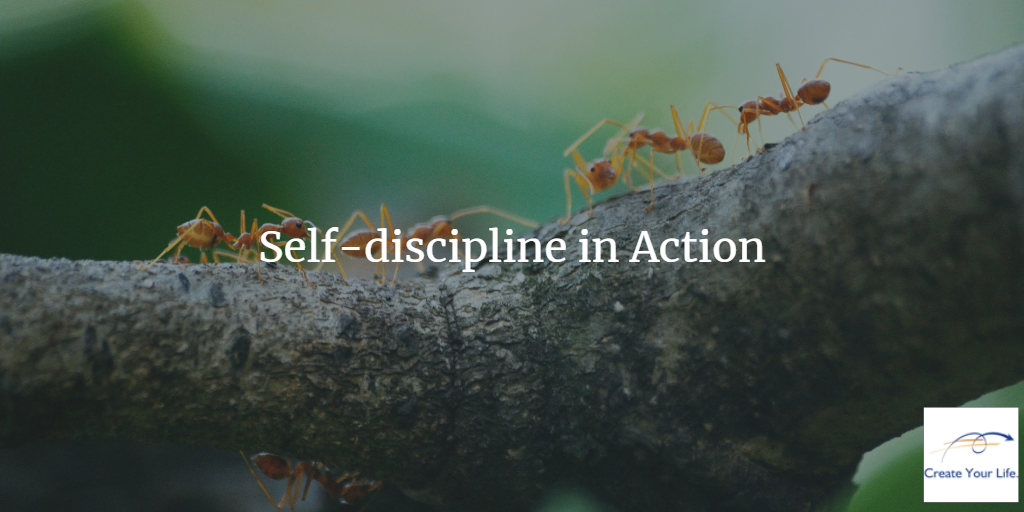Doing what you say you will do is a worthy ideal to strive for. And the more you practice it, the more discipline you will develop. Without self-discipline, it is highly unlikely you will achieve many worthy, desirable outcomes. But with self-discipline, you consistently achieve what you set out to do.
Title Photo by Poranimm Athithawatthee
The Ants and the Cookies
Early one morning, two ants went out foraging for food. As luck would have it, they came upon two huge chocolate chip cookies. “Wow!” exclaimed the first ant. “These cookies are gigantic! One of these would feed my family for a whole month!”
“Let’s take them home!” agreed the second aunt.
But that proved much easier said than done. The ants set to work, tugging and pulling at the giant cookies. But they couldn’t budge them. Suddenly, a small piece of cookie broke off in the first ant’s grasp. “Well,” she said, “at least I can take this piece to my family.”
“Go ahead,” the other ant replied. “I’m not going to waste my time on a small piece. I’m gonna take the whole cookie.” And she continued to push and tug.
So the first ant took her small piece of cookie home. Soon she was back and broke off another small bit. Back she went with it to her home. The second ant continued to push and tug.
Back and forth the first ant went, carrying a small piece of her cookie each time. After a few hours, the second ant cried “This is hopeless! I’ll never get this cookie home.” And she turned her back and went home with nothing.
But by the end of the day, the first ant had carried her entire cookie home to her family, tiny bit by tiny bit. [1]

What Is Self-Discipline?
My favorite definition of self-discipline comes from the Cambridge Dictionary It is “the ability to make yourself do things you know you should do even when you do not want to.”
Self-discipline gives you the ability to push forward and take action, no matter how you feel in the moment.
The Three Forms of Discipline
Brian Johnson, one of my mentors, talks about three forms of discipline. The three types were first defined by Phil Stutz and include Reactive, Structural, and Expansive discipline. Let’s look briefly at each one.
Reactive discipline works just as the name implies. Something happens to disrupt or tempt you. You step in between “the stimulus and the response” and make a choice. You exert discipline in the moment to stay your chosen course.
Structural discipline depends on your crafting a “structure” or a system of routines and habits that keep you on course virtually automatically. We’ll talk more about this in a moment.
Expansive discipline, according to Phil Stutz, is the most important and the most difficult. Every moment we have a choice: to take a step toward self-actualization (to borrow from Abraham Maslow) or to take a step back. When we cultivate this type of discipline, we step forward more times than we step backward.
To put our discipline into action, we must practice all three types.
The Virtues of Temperance and Self-Control
“At dawn, when you have trouble getting out of bed, tell yourself: ‘I have to go to work as a human being. What do I have to complain of, if I’m going to do what I was born for, the things I was brought into the world to do? Or is this what I was created for? To huddle under the blankets and stay warm?'” ~ Marcus Aurelius
Stoic philosophers recognized the importance of self-control in living a good life. They identified four virtues which include wisdom, justice, courage, and temperance. [Ghezelbash] Temperance comprises modesty, self-control, and discipline. [Ghezelbash] All four of the virtues are necessary for a good life, but without discipline and self-control, it can be difficult to master the others.
Without discipline, you and I are like ships without rudders, tossed about by the winds and waves of external forces and by every internal whim. But when we put self-discipline into action, we become the masters of our fate and the captains of our souls.
Self-discipline in Action
I hope we agree that self-discipline is a vital part of creating a life of meaning, purpose, and Service. How do we build the self-discipline that we require? How do we put self-discipline into action?
Well, the same way we build any skill, through persistence and practice.
Persistence
“I will persist until I succeed.” ~ Og Mandino
I have said this before and I’ll repeat it now: Small steps lead to the goal BUT you must take the steps. Intention is important. It brings your purpose, your target, into awareness. But awareness is only the beginning. You must follow up on your intention with action. And you must do this again and again and again and again.
You must persist.
Practice
“We don’t go to the gym to lift styrofoam weights.” ~ Brian Johnson
We build discipline through practice, just as we build muscles by going to the gym. You don’t get stronger by lifting styrofoam weights but you risk injury if you try to do too much too fast.
Start by doing small acts every day. Be consistent. Over time, increase your exercise of self-discipline, a little at a time, and watch your discipline grow stronger.
Building Self-Discipline
But what should you practice? Here are a few exercises or techniques that have been shown as effective ways to build self-discipline.
Take Small Steps
We come back to this over and over for a reason. To make lasting change, to break old unhelpful habits and create new positive habits, requires time and effort. And as we said above, persistence. The easiest, sometimes the only, way to do this is by taking small steps, over and over and over.
Of course, as you progress, your small steps may become a little bigger, but the main thing is to take them consistently. Consistency trumps size every time.
Update Your Environment
To make lasting change, change your environment.
Do this by removing temptations that make your practice of self-discipline more difficult. If you want to improve your eating habits, remove the junk food from your cabinets. Put the fresh fruits and vegetables in plain view, easy to reach. Hide the cookies and doughnuts (if you have to keep them) and make them hard to get to.
Conversely, make the actions you want to do easier to accomplish. If you want to read more, keep your book handy, within reach. Put the TV remote in a drawer where you have to expend a bit of effort to get it.

Use Implementation Intentions
Implementation intentions help you decide in advance the behavior you want to perform in a given situation. They specify when, where, and how you will take the actions that lead to the desired behavior. It’s a proven, effective technique to increase your chances of remembering to do the behavior in a specific situation.
Implementation intentions are in the form of an “If . . . then” statement: “If situation x occurs, then I will perform response y”. [Gollwitzer]
For example, to exercise more: “If I feel tired after work, then I will go for a walk around the block instead of sitting down on the couch.” Or, for keeping clutter cleared away: “When I finish using any item, I will immediately put it back in its home.”
Implementation intentions are most effective when they are specific, realistic, and time-bound. The more specific you can be about the situation and the behavior, the more likely you are to follow through. They help you create specific plans that link situations with desired behaviors. These plans can significantly increase the likelihood of following through on your intentions, achieving your goals, and putting your self-discipline into action.
Automate Behaviors
A part of demonstrating self-discipline is through the use of willpower. And, as we know, the best and wisest way to use willpower is to put it to work to build good habits. That’s how we automate desired behaviors. And when we do that, we decrease the need for self-discipline.
The basics for building a habit are having a cue, a routine, and a reward. A cue is the trigger that “tells your brain to go into automatic mode”. [Duhigg] The routine is the behavior that is triggered by the cue. And the reward helps your brain decide if the loop is worth remembering and repeating in the future.
We’ve gone in-depth on the process of building habits in the past. You can find more specifics about how to build habits in one or all of these posts:
Putting Self-discipline into Action
So, how is your self-discipline? Do you try to “move the whole cookie” in one huge attempt, then give up because it’s too hard? What would your life look like if you exercised more discipline and exercised routinely? What would that mean for your health and physical well-being? How would it be if you worked at improving your discipline and worked all the time you are at work? What would that do for your productivity? What if you strengthened your discipline and weakened the pull of distractions? Could you then put down your phone for a few hours or a whole day?
Try this experiment:
- Select one area that would benefit from a bit more discipline.
- Decide on one small step you could take to practice using self-discipline in this area.
- Look for ways to adapt your environment to make it easier to do the practice and harder to avoid doing it.
- Set up an implementation intention to help you remember to employ your discipline in the situation.
- Define a cue, a routine, and the reward you will use to make this action habitual.
Self-control takes persistent practice. Don’t focus on doing it “right”. Focus simply on doing the best you can, every time the situation arises.
Doing what you say you will do is a worthy ideal to strive for. And the more you practice it, the more discipline you will develop. Without self-discipline, it is highly unlikely you will achieve many worthy, desirable outcomes. But with self-discipline, you consistently achieve what you set out to do. You become the “master of your fate and the captain of your soul.” And that is, indeed, embracing your Excelerated Life™!
Where could you benefit by developing a bit more self-discipline?
Develop the plan you will use to persistently practice this step.
Share your experience by leaving a comment below.
Excelerated Discipline™ — doing what you say you will do — is one step in creating your Excelerated Life™, a life of flourishing and well-being, and a life of meaning, purpose, and service.
Read more about the Excelerated Life™.
Footnotes:
[1] Adapted from “Motivation Mondays: Self-control”. [See Resources.]
Resources:
Duhigg, Charles. The Power Of Habit. New York: The Random House Publishing Group, 2012.
Ghezelbash, Philip. “The Philosophy Of Stoicism: 4 Lessons From Antiquity On Self-Discipline.” Daily Stoic. Daily Stoic,. Web. August 19, 2023.
https://dailystoic.com/self-discipline/#:~:text=Stoicism%20is%20an%20ancient%20Greco,%2Dcontrol%2C%20discipline%20and%20modesty.
Gollwitzer, Peter M. and John A. Bargh. Psychology of Action: Linking Cognition and Motivation to Behavior. New York: The Guilford Press, 1996.
Mandino, Og. The Greatest Secret in the World. New York: Bantam Books, 1978.
Obih-Frank, Elizabeth. “Motivation Mondays: Self-control.” Mirth and Motivation. She Media Collective, January 28, 2019. Web. August 19, 2023.
https://mirthandmotivation.com/2019/01/28/motivation-mondays-self-control/


